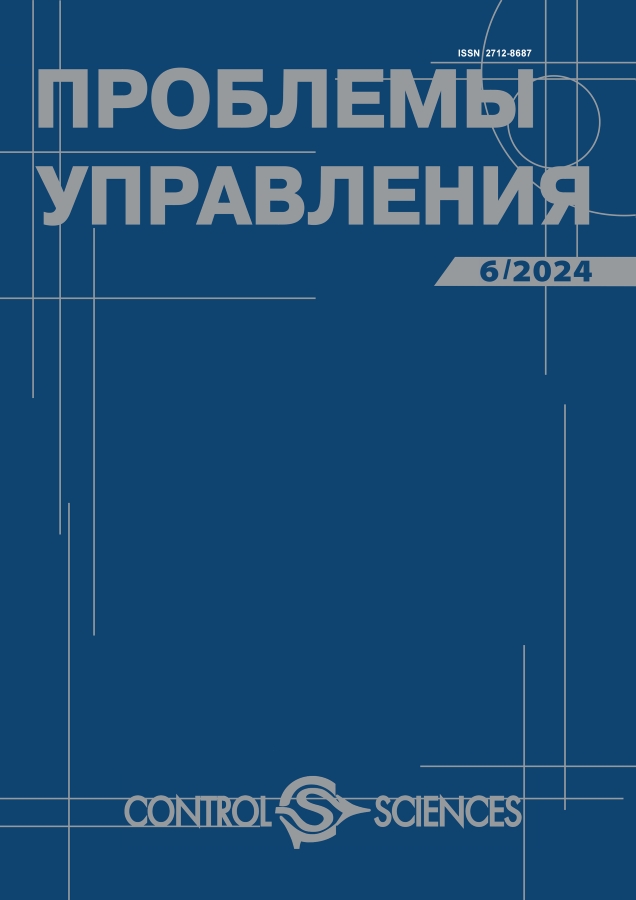№ 5 (2024)
Обзоры, прогнозы
Анализ методов среднесрочного прогнозирования процессов со структурными сдвигами на финансовых и товарных рынках
Аннотация
Рассматриваются методы формирования среднесрочного прогноза цен на финансовых и товарных рынках. Прогнозируемые процессы являются нестационарными, нелинейными, в них присутствуют структурные сдвиги, возникающие вследствие системных изменений в структуре рынка и оказывающих воздействие на него экстремальных событий. С увеличением горизонта прогноза вероятность возникновения структурных сдвигов возрастает, поэтому возникает задача прогнозирования c учетом возможных изменений в процессе на горизонте прогноза. Для прогнозирования будущих изменений рассматриваемого процесса необходимо расширение информационного поля, на котором формируется прогноз: включение экспертных суждений, результатов качественного анализа процессов, например, с применением методов фундаментального анализа, когнитивного анализа и алгоритмов их реализации. Построение среднесрочных прогнозов цен на финансовых и товарных рынках является необходимым элементом в решении задач планирования и управления социально-экономическими и производственными системами, а также в решении задач инвестиционного управления. В настоящем обзоре рассмотрены особенности прогнозируемых процессов, определяющие требования к методам формирования среднесрочных прогнозов, их реализации и отбору включаемой в прогноз информации, необходимой для обнаружения будущих изменений в процессе и причинных факторов их возникновения. Рассмотрены модели и методы статистического прогнозирования, искусственного интеллекта и фрактального анализа, а также методы, использующие в алгоритме прогнозирования информацию из различных источников: экспертных, новостных, данных поисковых систем. Проведено обобщение результатов обзора в контексте решения задачи среднесрочного прогнозирования. В заключении обозначены перспективные, по мнению авторов, направления исследований в этой области.
Проблемы управления. 2024;(5):3-24
 3-24
3-24


Управление в социально-экономических системах
Сценарное моделирование развития страны на основе индикативного планирования
Аннотация
В работе рассмотрена многоуровневая модель индикативного планирования целевых индикаторов в системе «мир (много стран) – страна – отрасли – ресурсы – мероприятия». В предлагаемой имитационной модели реализуется подход на основе сценарного планирования. Поставлена задача анализа и прогноза целевых индикаторов страны на примере показателя ВВП по ППС. Проведены оценки необходимого для реализации целевого сценария роста ВВП и валовой добавленной стоимости (ВДС) отдельных отраслей. Определены удельные показатели эффективности по финансовым и кадровым ресурсам: производительность труда и капиталоемкость. Сделана оценка необходимых для реализации целевого сценария инвестиций в основной капитал и численность занятых. Показано, что для реализации целевого сценария роста ВДС необходимы меры по ускорению роста производительности труда, выделены наиболее актуальные отрасли. В качестве исходных данных использовались данные Мирового банка и Росстата.
Проблемы управления. 2024;(5):25-41
 25-41
25-41


Задача стимулирования в рефлексивной игре с точечной структурой информированности
Аннотация
Рассмотрена модель коллективного поведения агентов в ситуации игровой неопределенности и неполной информированности. В качестве модели принятия решений агентами используется рефлексивная игра, в которой участники принимают решение на основе иерархии представлений о параметрах игры, представлений о представлениях и т. д. В центре внимания данной работы – рефлексивные игры с точечной структурой информированности и линейным наилучшим ответом игроков. Показано, что информационное равновесие в таких играх аналогично равновесию Нэша в игре на сети; в явном виде записаны выражения для равновесных ответов игроков, указаны условия существования и единственности равновесия. Приводится формулировка задачи стимулирования, аналогичной задаче стимулирования в игре на сети: показана взаимосвязь между равновесием в игре с общим знанием и равновесием в игре с неполной информированностью, в которой центр сообщает новые стимулы игрокам индивидуально.
Проблемы управления. 2024;(5):42-48
 42-48
42-48


Информационные технологии в управлении
Функционально-воксельное моделирование алгоритма движения к цели на основе R-функций
Аннотация
Рассматриваются аналитические подходы к решению задач прокладки пути с учётом препятствий. Сравниваются два принципа аналитического моделирования препятствий на сцене: с применением метода потенциалов и путём R-функционального моделирования. Приводится принцип функционально-воксельного конструирования сложных вычислительных процессов на примере моделирования R-функции объединения или пересечения области двух функций. Разбираются основы арифметических операций над локальными геометрическими характеристиками, описывающими компоненты однородного единичного вектора локальной функции. Демонстрируется принцип денормирования таких компонент для применения в арифметических действиях, составляющих R-функцию. Рассматривается моделирование сцены в виде компоновки концентрических объектов и локальной функции описания цели поверхностью воронки в указанной точке. Рассматривается алгоритм динамического формирования итоговой локальной функции объединения поверхности воронки с поверхностью сцены в текущей точке. На основе итоговой локальной функции определяются компоненты вектора направления градиентного движения к заданной цели.
Проблемы управления. 2024;(5):49-56
 49-56
49-56


Управление подвижными объектами и навигация
Программная 3D-траектория защитника в ADT-игре при неполной априорной информации у цели
Аннотация
В трехмерном пространстве рассматривается ADT-игра (англ. Attacker–Defender–Target), в которой Цель (Target) совершает плоское движение по окружности с постоянной скоростью. Атакующий игрок (Attacker) движется равномерно и прямолинейно из произвольной точки верхней полусферы. Специфика постановки состоит в том, что на борту Цели имеется мобильный Защитник (Defender), в задачу которого входит перехват всех возможных опасных для Цели (в смысле точечной встречи) траекторий движения Атакующего. Задача осложняется тем, что Цель и Защитник в процессе движения не видят атакующего игрока. Им известен лишь начальный пеленг, в то время как текущий пеленг, начальная и текущая дистанции до Атакующего им не известны. По этой причине движение Цели и Защитника предполагается программным.
Проблемы управления. 2024;(5):57-63
 57-63
57-63












